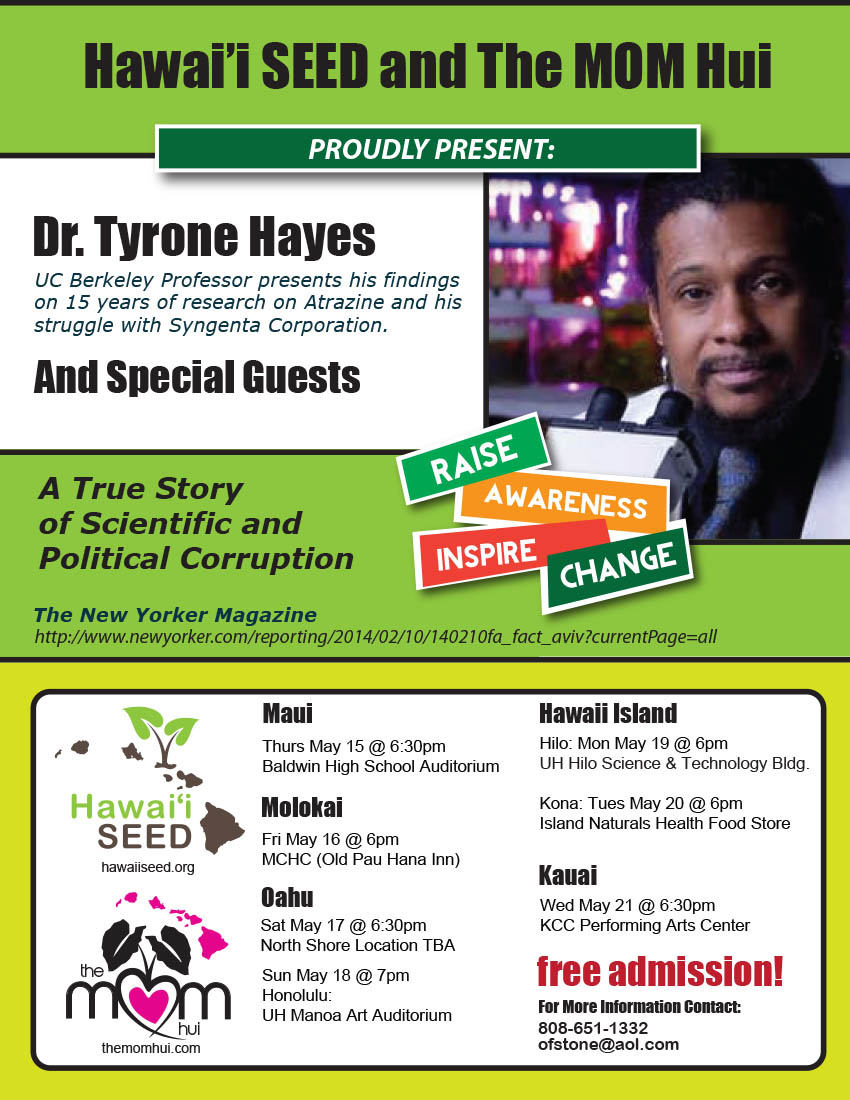-
Hawai`i SEED/MOM Hui Tour with Tyrone Hayes
Posted on May 4, 2014 by Blake in Agriculture, Education, EventCalender, Events, Kaua‘i News, Maui News, Moloka‘i News, MOMhui, News, Newsletter, O‘ahu NewsHawai’i SEED Raise Awareness Inspire Change Speaker Series presents:
DR. TYRONE HAYES – SILENCING THE INDEPENDENT SCIENTIST
Honolulu, HI-May 2, 2014
Hawai’i SEED today announced the state-wide speaking tour of world-renowned University of California Berkeley Professor of Integrative Biology Dr. Tyrone Hayes. Dr. Hayes will be joined by local food advocates from each island community. Paul Towers from Pesticide Action Network will be speaking as well, presenting an overview of pesticide use nationally and internationally and the significant role that Hawaii plays as ground zero for open-air pesticide experimentation.
Dr. Hayes’ speaking tour dates:
- May 15-Maui, Wailuku, Henry Perrine Baldwin High School Auditorium, 6:30pm
- May 16-Molokai, Kaunakakai, Molokai Community Health Center, 6:00pm
- May 17-Oahu, North Shore Location TBA 6:30pm
- May 18-Oahu, Honolulu, UH Manoa Art Auditorium, 7:00pm
- May 19-Hawaii, Hilo, UH Hilo Science & Technology Building, 6:00pm
- May 20-Hawaii, Kona, Island Naturals Health Food Store, 6:00pm
- May 21-Kauai, Lihue, Community College Performing Arts Center, 6:30pm
Dr. Hayes is best known for his research findings that Swiss Chemical Company Syngenta’s herbicide atrazine is an endocrine disruptor that not only demasculinizes male frogs but transforms them into fully functioning reproductive females. Dr. Hayes is also an advocate for critical review and regulation of pesticides and other chemicals that may cause adverse health effects. Dr. Hayes has presented hundreds of papers, talks, and seminars on the role of environmental chemical contaminants in global amphibian declines and in the health disparities that occur in minority and low-income populations.
Despite his research being contested by Syngenta, it was used as the basis for the settlement of a multimillion-dollar class action lawsuit against them. According to the lead plaintiff’s lawyer Stephen M. Tillery, “Science has been fighting an uphill battle against giant pesticide manufacturers like Syngenta who claim that a little weed killer in your drinking water won’t hurt you. Independent scientists now believe that even trace amounts can harm you and your children for generations to come.”
According to Joy Shih, a doctoral candidate at the University of Hawaii’s School of Ocean and Earth Science and Technology, “The chemical poses a particular threat in Hawaii because of the islands’ geography.” She thinks atrazine should be banned. “I think of Hawaii as one giant watershed,” she said. “There is no inland, from the tops of the mountains, everything flows into the ocean. So anything that you apply that is water soluble ends up in the ocean. Fish are definitely affected and coral is affected.” Shih said that studies show that atrazine causes coral bleaching and harms phytoplankton, which rest at the bottom of the aquatic food chain.
The use of atrazine application in sugarcane and pineapple production in Hawaii has threatened
aquatic life for decades, but the herbicide is regularly used for corn production as well.
According to Pesticide Action Network, there are many viable ways of producing corn and
growing food without relying on atrazine. Healthy, resilient farming systems can grow food to
feed Hawaii, without the use of hazardous pesticides. Syngenta, which is based in Basel, sells
more than fourteen billion dollars’ worth of seeds and pesticides a year and funds research at
some four hundred academic institutions around the world“We are thrilled to be hosting Dr. Hayes in Hawaii for a five island speaking tour, especially on
the heels of the recent New Yorker Magazine expose vindicating his claims that for the last
fifteen years chemical giant Syngenta has waged a campaign to discredit him and his peerreviewed
findings” says Hawai’i SEED President Jeri Di Pietro. “In light of Syngenta’s current
litigation against the County of Kauai and their aggressive campaign to discredit Dr. Hayes,
obvious parallel lines can be drawn about the threat to the independent research community
and communities protecting their environment.”“Atrazine in Hawaii” Civil Beat. March 11, 2013.
http://www.civilbeat.com/pesticide-contamination-of-drinkingwater-
worries-state-health-officials/“A Valuable Reputation: After Tyrone Hayes said that a chemical was harmful, its maker
pursued him”. The New Yorker. February 7, 2014.
http://www.newyorker.com/reporting/2014/02/10/14/“It’s Been Crazy:” Berkeley Biologist Feels Vindicated by Reaction to New Yorker Profile.
California Magazine. February 25, 2014.
www.alumni.berkeley.edu/its-been-crazy-berkeley-biologist-feels-vindicated-reactionContact:
Jeri Di Pietro
808 651-1332
ofstone@aol.com
Mary Lacques
808 652-5286
hokuokekai50@msn.comPoster:





